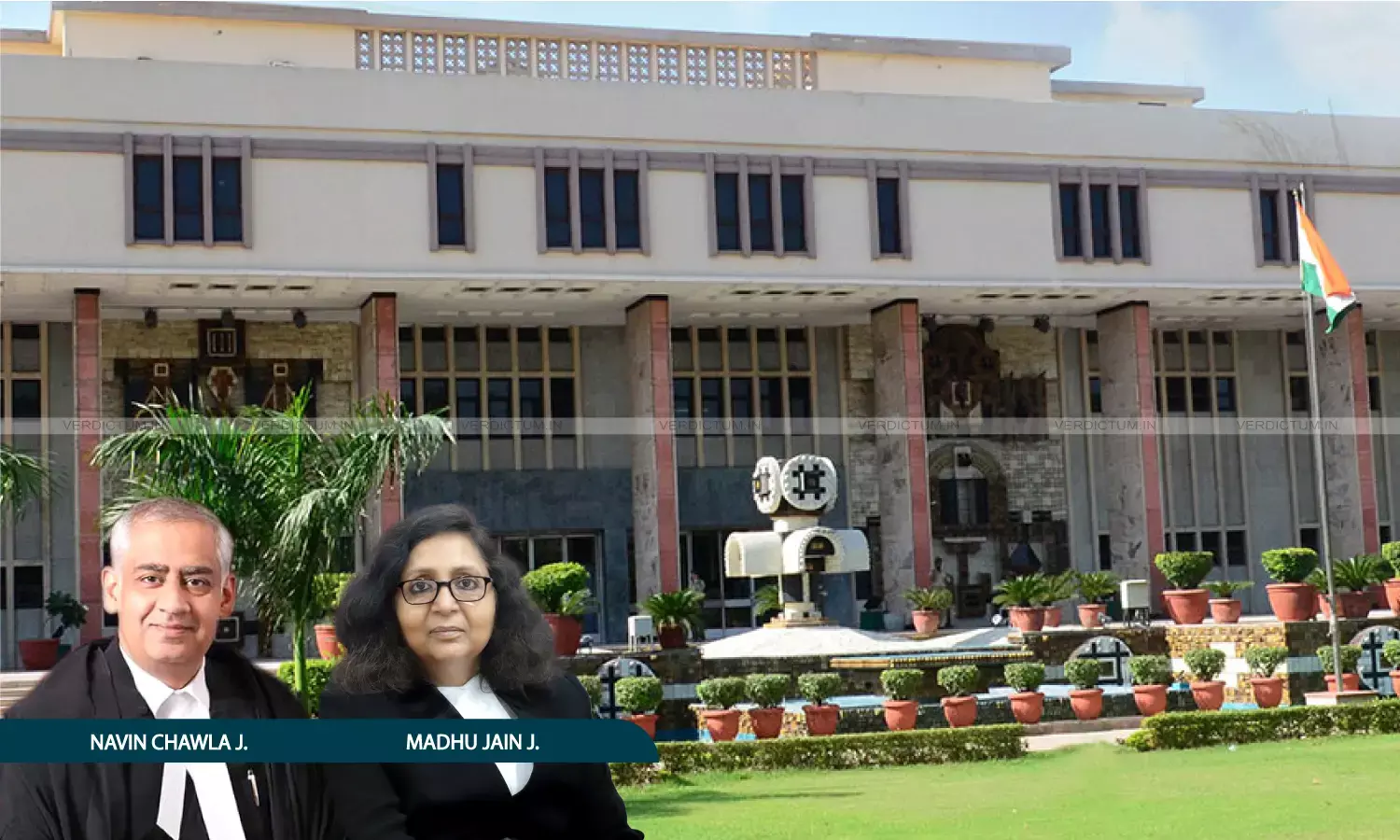Denial Of Child Care Leave Despite Repeated Representations & In Absence Of Substantiated Administrative Necessity Can’t Be Sustained In Law: Delhi High Court
The Delhi High Court was considering a petition challenging the Order of the Central Administrative Tribunal upholding the penalty order passed by the Disciplinary Authority.

Justice Navin Chawla, Justice Madhu Jain, Delhi High Court
While setting aside a penalty of reduction of pay imposed upon a woman officer whose Child Care Leave was not sanctioned on various occasions, the Delhi High Court has held that the denial of CCL, despite repeated representations and in the absence of a substantiated administrative necessity, cannot be sustained in law.
The High Court was considering a petition challenging the Order of the Central Administrative Tribunal, Principal Bench, New Delhi (Tribunal) whereby the Tribunal dismissed the application filed by the petitioner and upheld the penalty order passed by the Disciplinary Authority.
The Division Bench of Justice Madhu Jain and Justice Navin Chawla held, “The denial of CCL in such circumstances, despite repeated representations and the absence of a substantiated administrative necessity, cannot be sustained in law. The approach of the respondent, rather than reflecting a balanced consideration of the petitioner’s legitimate request, demonstrates mechanical rejection and a disregard to the beneficial intent underlying the CCL scheme, particularly as recognized in Kakali Ghosh (supra)."
Advocate Rajesh Katyal represented the Petitioner, while SPC Ranvir Singh represented the Respondent.
Factual Background
The petitioner, serving as an Assistant Section Officer in the Central Secretariat Service, is the mother of two daughters. During the academic years 2012–2016, both her daughters were pursuing studies in Classes X and XII, and the petitioner had applied for Child Care Leave (CCL) on several occasions for their examinations and related needs. While being posted in the Ministry of Overseas Indian Affairs, the petitioner applied for CCL for 61 days. Though the application was recommended by the Section Officer, it was not sanctioned by the competent authority. The petitioner joined duty and was thereafter transferred to the National Commission for Backward Classes (NCBC). She applied for 54 days’ CCL in connection with her younger daughter’s Class X Board Examinations.
The leave, however, was not sanctioned on various occasions, and the subsequent period of her absence from duty became the subject of disciplinary proceedings. The penalty imposed upon the petitioner was a reduction of pay by two stages for three years, with denial of increments and consequential effect on future progression. Aggrieved by the charge memorandum, the order of penalty, and the Office Order, the petitioner filed an application before the Tribunal. The Tribunal, upon consideration of the material on record, dismissed the said application by Impugned Order. The petitioner thus filed the writ petition.
Reasoning
On a perusal of the facts of the case, the Bench noted that the petitioner, a woman officer serving as an Assistant Section Officer, had sought CCL on multiple occasions between 2013 and 2015. “While it is trite that leave, including CCL under Rule 7 of the CCS (Leave) Rules, cannot be claimed as a matter of right, it is equally well settled that the power to sanction or decline such leave must be exercised reasonably, having due regard to the object and purpose for which the CCL was introduced”, the order read.
Reference was made to Rule 43-C(1) of the CCS (Leave) Rules, which provides that a woman government servant may be granted CCL for the purpose of rearing or caring for a minor child. The Bench noticed that the record reflects that the petitioner’s section had additional staff available at the relevant time and similar leave requests by other employees had been granted during the same period.
It was noticed that the language employed in the disagreement note showed that the Disciplinary Authority had already formed a conclusive opinion on the petitioner’s guilt. The note recorded that the Inquiry Officer relied on only the contentions of the petitioner and ignored all the documentary evidence in spite of “substantiated misdemeanor on part of the C.O.”, a phrase that conveyed finality rather than tentativeness. “Such pre-judgment renders the subsequent consideration of the petitioner’s representation an empty formality. The process, therefore, stands vitiated for non-compliance with the mandatory procedural safeguard embodied in Rule 15(2)”, it held.
The Bench was of the view that the penalty imposed upon the petitioner, that is, reduction of pay by two stages for three years, with denial of increments and consequential effect on future progression, was manifestly disproportionate to the alleged misconduct. The allegations did not involve moral turpitude, corruption, financial irregularity, or any act prejudicial to the integrity of service and they stemmed entirely from the petitioner’s effort to avail CCL for her minor daughters. “The punishment, therefore, shocks the conscience of this Court…”, it added.
Finding that the disciplinary proceedings against the petitioner suffered from procedural irregularities and substantive infirmities, the Bench allowed the Petition and set aside the impugned penalty order. The Bench further directed the respondent to restore the petitioner’s pay and consequential service benefits within a period of eight weeks.
Cause Title: Ritu Ravi Prakash v. Union of India (Neutral Citation: 2025:DHC:10204-DB)
Appearance
Petitioner: Advocates Rajesh Katyal, Seema Katyal
Respondent: SPC Ranvir Singh, Advocate Vikas Kumar Singh

